Current Affairs 21 Sep 2023
Today’s News
Azerbaijan’s Interference in Nagorno-Karabakh
(Current Affairs 21 Sep 2023 | Relevant for Prelims)

- Azerbaijan launched an anti-terrorist operation in the Armenia-backed breakaway enclave of Nagorno-Karabakh.
- The region has long been at the centre of tensions between Azerbaijan and Armenia, leading to two wars for its control. The last large-scale conflict in Nagorno-Karabakh lasted for six weeks in 2020 before a Russian-brokered truce. The ceasefire saw Armenia cede swathes of territory it had controlled since the 1990s.
- Nagorno-Karabakh is a mountainous and heavily forested region that under international law is recognised as part of Azerbaijan.
- However, ethnic Armenians who constitute the vast majority of the population there reject Azeri rule (the legal system of Azerbaijan).
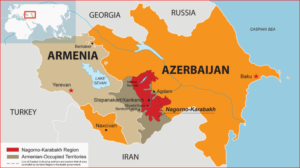
- After Azerbaijan’s troops were pushed out of the region following a war in the 1990s, these ethnic Armenians have been in administrative control of Nagorno-Karabakh, with support from Armenia.
- The self-declaration of independence by Nagorno-Karabakh in September 1991 in the backdrop of an imminent collapse of the USSR resulted in a war between Azerbaijan and Nagorno-Karabakh — supported by Armenia.
String Technology and its Impact on Lithium Production
(Current Affairs 21 Sep 2023 | Relevant for Prelims)

- A new technology called “String” has emerged, with the potential to streamline the extraction of lithium, a crucial component in batteries used in smartphones and electric vehicles.
- Lithium production is a resource intensive and time-consuming process as most of the Lithium produced in the world is extracted from Brine Reservoirs, located in Salt flats.
- String Technology involves the use of porous fibres twisted into strings, which have been meticulously engineered.
- These strings possess a water-loving (hydrophilic) core and a water-repelling surface.
- When one end of the string is immersed in a saltwater solution, capillary action is initiated, mimicking the way trees transport water from their roots to their leaves.

- As the water evaporates from the string’s surface, it leaves behind salt ions, including sodium and lithium. Over time, as the salts become increasingly concentrated, they form sodium chloride and lithium chloride crystals, which can be easily harvested.
- Thus, completing the process of Lithium production by String Technology.
Biohacking
(Current Affairs 21 Sep 2023 |Relevant for prelims)

- Biohacking has gained more attention and popularity in recent years, it is the practice of modifying or enhancing one’s own body or biology using various methods, such as diet, supplements, devices, implants, or genetic engineering.
- Biohacking can have different goals, such as improving health, performance, well-being, or appearance, or exploring the limits and possibilities of human nature.
- The most well-known type of biohacking is genetic engineering, where individuals experiment with new technologies to enhance their physical appearance or capabilities.
- However, biohacking also raises ethical and safety concerns, particularly when individuals engage in risky or unproven procedures.
Legislating Change: The Women’s Reservation Bill must be implemented without delay
(Current Affairs 21 Sep 2023 |Relevant for GS Paper-2)
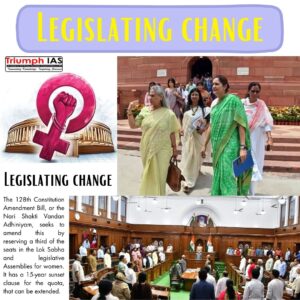
- The passage of the Women’s Reservation Bill in the Lok Sabha almost three decades after it was first tabled in Parliament is a welcome move that can finally shatter apolitical glass ceiling.
- With women Members of Parliament comprising only about 15% of the strength of the Lok Sabha, the gender inequality in political representation is stark and disturbing.
- The 128th Constitution Amendment Bill, or the Nari Shakti Vandan Adhiniyam, seeks to amend this by reserving a third of the seats in the Lok Sabha and legislative Assemblies for women.
- It has a 15year sunset clause for the quota that can be extended. Considering the fraught history of the struggle for women’s reservation, and several false starts despite the Rajya Sabha passing it in 2010, it is laudatory that the first Bill to be introduced in the new Sansad Bhavan has been passed in the Lok Sabha. But its implementation will be delayed as it has been tied to two factors, delimitation and the Census, and therein lies the rub.
- It is unfortunate that implementation is being linked to delimitation, for the principle of having a third of seats reserved for women has nothing to do with the territorial limits of constituencies or the number of Assembly or Lok Sabha constituencies in each State.
- Women will thus not have access to 33% reservation in the 2024 general election. The Bill also mandates that as nearly as one third of the seats reserved for Scheduled Castes and Scheduled Tribes will be set aside for women.
- The Opposition is demanding an internal quota for women of Other Backward Classes, but this should not be used as a ruse to delay implementation. In the meantime, proposals should be fine tuned to ensure that when it becomes an Act, it is not mere tokenism for women’s political representation.
- It is a fact that local bodies are better represented, with the share of women in panchayati raj institutions well above 50% in several States. Lessons must be imbibed on how women at the grassroots level have broken all sorts of barriers, from patriarchal mindsets at home to not being taken seriously in their official duties, and made a difference.
- Women struggle on so many other counts: they have uneven access to health, nutrition and education, there is a lack of safe places, women are also falling out of the workforce — among the G20 countries, India’s female labour force participation is the lowest at 24%.
- India, which gave women voting rights at the very outset, should not falter when it comes to ensuring better political representation for women. For growth, and instituting change in key areas, women need to have their say.
History of women reservation bill
- Political reservation of woman has been a long standing demand since the pre-independence period. Various committees have favoured political reservation of women.
- During the National Movement- The three women bodies sent a letter to the British Prime Minister in 1931 seeking political reservation for women.
- Constituent Assembly- The issue of women reservation also came up in Constituent Assembly debates. However it was rejected on the grounds that a democracy is expected to give representation to all groups.
- The Committee of the Status of Women in India 1971 and The National Perspective Plan for Women in 1988– Both these committees recommended reservation of women in the local bodies. These recommendations paved the way for the 73rd and 74th amendments to the Constitution which mandates all State governments to reserve one-third of the seats for women in the local bodies.
- However, the issue of reservation in the Parliament and Legislative Assemblies still remained and the Women’s Reservation Bill was brought in this regard.
- In 1996 The Women Reservation Bill was first introduced in 1996 as 81st Constitutional Amendment Bill by Deve Gowda Govt. The bill was referred to the select committee of parliament headed by Geeta Mukherjee. However the Bill lapsed with the dissolution of the Lok Sabha as no consensus could be formed over reservation for OBC women.
- In 1999 The Bill was reintroduced by the NDA government in the 13th Lok Sabha and was subsequently introduced twice in the year 2003. However the bills could not be passed and hence they lapsed.
- In 2004 The UPA government included reservation bill in its Common Minimum Programme and tabled it in Rajya Sabha to prevent it from lapsing again.
- In 2010 Women’s Reservation Bill introduced as 108th Constitutional Amendment Bill 2008 was passed in the Rajya Sabha and lapsed in the Lok Sabha. RJD, the JD(U) and the SP were its most vocal opponents. They demanded 33% reservation for backward groups within the 33% quota for women.
Keep calm: Enormity of climate change is no excuse to resort to risky mitigation strategies
(Current Affairs 21 Sep 2023 |Relevant for GS paper-3)

- India had its rain wise driest August in a century this year. While scientists are yet to link this anomaly with the chaotic effects of climate change, it underscores the constant threat of disrupted weather, the resulting consequences for the economy, and the importance of climate mitigation.
- One of the more desperate, and dangerous, ideas to have emerged from this impetus are solar radiation management (SRM): to block some of the incoming solar radiation to cool the earth’s surface.
- SRM’s dangers emerge from the fact that it interferes with natural mechanisms with unavoidabl-e planet wide effects. For example, if an SRM experiment by one country leads to more rain ov-er the Horn of Africa than expected, it could trigger a locust swarm that eventually destroys crops in Pakistan and India.
- There is currently no mechanism that holds a geo engineering government accountable to consequences beyond its borders nor through which affected countries can appeal for restitution.
- This is why the report of the Climate Overshoot Commission, released last week, calls for more research to close crucial scientific and governance gaps before any deliberations on the implementation of SRM like technologies.
- The commission was constituted by geo engineering researchers to assess ways to accelerate emission cuts. But while the report is careful to acknowledge that the scientific community does not understand SRM enough to attempt a deployment, even in experimental fashion, it also argues for retaining SRM in the mix of potential climate mitigation solutions.
- This is a precarious suggestion because even less controversial, but nonetheless problematic, mitigation technologies such as carbon capture take resources, focus, and political will away from the most effective strategy — cutting emissions — and increase emissions limits.
- SRM will only amplify this dilution. The commission also errs by claiming to act for the interests of developing countries at a time when corporate and political actors have hijacked their ‘room to develop’ to pursue economic growth at the expense of climate justice’.
Related Blogs…
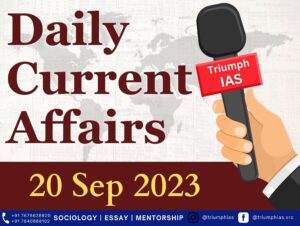 |
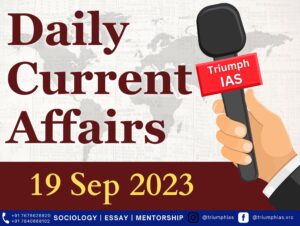 |
GS Related Practices Question…
To master these intricacies and fare well in the Sociology Optional Syllabus, aspiring sociologists might benefit from guidance by the Best Sociology Optional Teacher and participation in the Best Sociology Optional Coaching. These avenues provide comprehensive assistance, ensuring a solid understanding of sociology’s diverse methodologies and techniques.
Current affairs 21 September 2023, Current affairs 20 September 2023, , Today news, Today news GS, Today news upsc, Today news and views, Today news 2023, Today news Current affairs September 2023, Current affairs news, Current affairs book pdf, Current affairs best blog, Current affairs for UPSC, Current affairs 2023, Current affairs contact, Current affairs book, Current affairs program meaning

Choose The Best Sociology Optional Teacher for IAS Preparation?
At the beginning of the journey for Civil Services Examination preparation, many students face a pivotal decision – selecting their optional subject. Questions such as “which optional subject is the best?” and “which optional subject is the most scoring?” frequently come to mind. Choosing the right optional subject, like choosing the best sociology optional teacher, is a subjective yet vital step that requires a thoughtful decision based on facts. A misstep in this crucial decision can indeed prove disastrous.
Ever since the exam pattern was revamped in 2013, the UPSC has eliminated the need for a second optional subject. Now, candidates have to choose only one optional subject for the UPSC Mains, which has two papers of 250 marks each. One of the compelling choices for many has been the sociology optional. However, it’s strongly advised to decide on your optional subject for mains well ahead of time to get sufficient time to complete the syllabus. After all, most students score similarly in General Studies Papers; it’s the score in the optional subject & essay that contributes significantly to the final selection.
“A sound strategy does not rely solely on the popular
Opinion of toppers or famous YouTubers cum teachers.”
It requires understanding one’s ability, interest, and the relevance of the subject, not just for the exam but also for life in general. Hence, when selecting the best sociology teacher, one must consider the usefulness of sociology optional coaching in General Studies, Essay, and Personality Test.
The choice of the optional subject should be based on objective criteria, such as the nature, scope, and size of the syllabus, uniformity and stability in the question pattern, relevance of the syllabic content in daily life in society, and the availability of study material and guidance. For example, choosing the best sociology optional coaching can ensure access to top-quality study materials and experienced teachers. Always remember, the approach of the UPSC optional subject differs from your academic studies of subjects. Therefore, before settling for sociology optional, you need to analyze the syllabus, previous years’ pattern, subject requirements (be it ideal, visionary, numerical, conceptual theoretical), and your comfort level with the subject.
This decision marks a critical point in your UPSC – CSE journey, potentially determining your success in a career in IAS/Civil Services. Therefore, it’s crucial to choose wisely, whether it’s the optional subject or the best sociology optional teacher. Always base your decision on accurate facts, and never let your emotional biases guide your choices. After all, the search for the best sociology optional coaching is about finding the perfect fit for your unique academic needs and aspirations.
To master these intricacies and fare well in the Sociology Optional Syllabus, aspiring sociologists might benefit from guidance by the Best Sociology Optional Teacher and participation in the Best Sociology Optional Coaching. These avenues provide comprehensive assistance, ensuring a solid understanding of sociology’s diverse methodologies and techniques. Sociology, Social theory, Best Sociology Optional Teacher, Best Sociology Optional Coaching, Sociology Optional Syllabus.
Best Sociology Optional Teacher, Sociology Syllabus, Sociology Optional, Sociology Optional Coaching, Best Sociology Optional Coaching, Best Sociology Teacher, Sociology Course, Sociology Teacher, Sociology Foundation, Sociology Foundation Course, Sociology Optional UPSC, Sociology for IAS,
Follow us :
🔎 https://www.instagram.com/triumphias
🔎https://www.youtube.com/c/TriumphIAS
https://t.me/VikashRanjanSociology
Find More Blogs
|
Scope of the subject and comparison with other social sciences |
|||
|
|
|
|
Modernity and social changes in Europe |

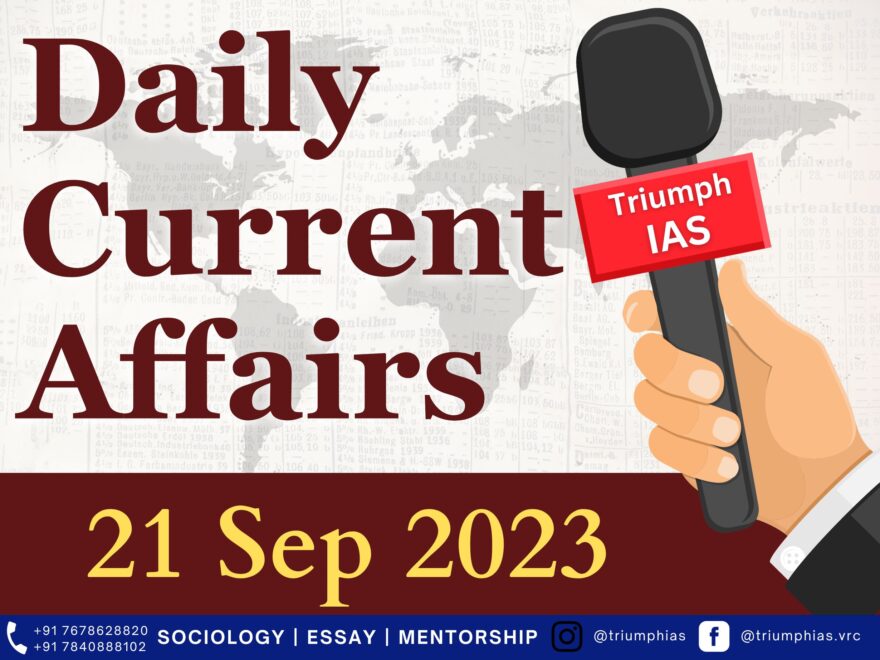
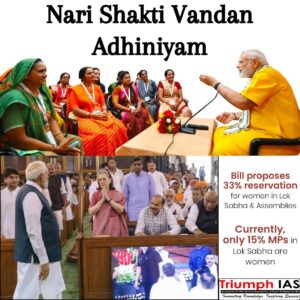
One comment